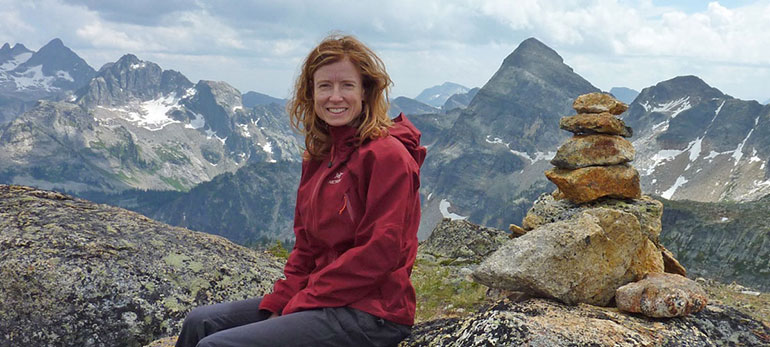
UBC Okanagan sustainability researcher Lael Parrott, report editor and contributor
Experts say Canada’s mountains are bellwethers of change
New reporting led by UBC researchers is examining how changing conditions of Canada’s mountainous regions may impact the rest of the country.
Mountains are a rich source of biodiversity and provide natural and economic resources on which humans and other species depend. They comprise a quarter of the world’s land surface and are home to a quarter of the world’s human population. Mountains also provide the world’s freshwater needs—they are the water towers of the world.
“Understanding how our mountains respond to climatic and environmental changes is more important than ever,” says UBC Okanagan Sustainability Professor Lael Parrott, report contributor and editor. “Our world’s ecosystems are deteriorating quickly and mountains are the bellwethers of change.”
The 2019 State of the Mountains Report describes the causes and consequences of the 2017 and 2018 extreme wildfires in North America. UBC Vancouver Forestry Professor Lori Daniels, one of the contributors to the report, suggests that coexisting with wildfires will be part of society’s adaptation to climate change.
“Now is the time for transformative change,” she says.
Other articles in the report include a call for increased Indigenous participation in mountain research, an examination of the challenges of sustainable tourism, and stories about the ecology of alpine species ranging from snow algae to caribou.
“These summaries will provide valuable resources for learning about Canada’s mountains,” says Parrott. “Our goal is to increase awareness and inform Canadians about the changes in mountain places and how these affect people and other species. This knowledge, in turn, may lead to support for policies to preserve alpine environments and manage our cumulative human impacts on mountain ecosystems.”
“In times of change, mountains need stewards more than ever,” adds Parrott.
About the State of the Mountains Report
The 2019 State of the Mountains Report, published by the Alpine Club of Canada, is a collection of expert summaries written to raise awareness about the ways a changing climate is transforming the alpine environment. Editors include University of Alberta mountain historian Zac Robinson, mountain ecology researcher David Hik from Simon Fraser University and sustainability scientist Lael Parrott from UBC’s Okanagan campus.
The State of the Mountains Report is an annual publication of the Alpine Club of Canada, in partnership with The Royal Canadian Geographic Society.
Both Lael Parrott and Zac Robinson serve on the Board of Directors of the Alpine Club of Canada. David Hik is a Fellow of the Royal Canadian Geographic Society.
About UBC’s Okanagan campus
UBC’s Okanagan campus is an innovative hub for research and learning in the heart of British Columbia’s stunning Okanagan Valley. Ranked among the top 20 public universities in the world, UBC is home to bold thinking and discoveries that make a difference. Established in 2005, the Okanagan campus combines a globally recognized UBC education with a tight-knit and entrepreneurial community that welcomes students and faculty from around the world.
To find out more, visit: ok.ubc.ca.